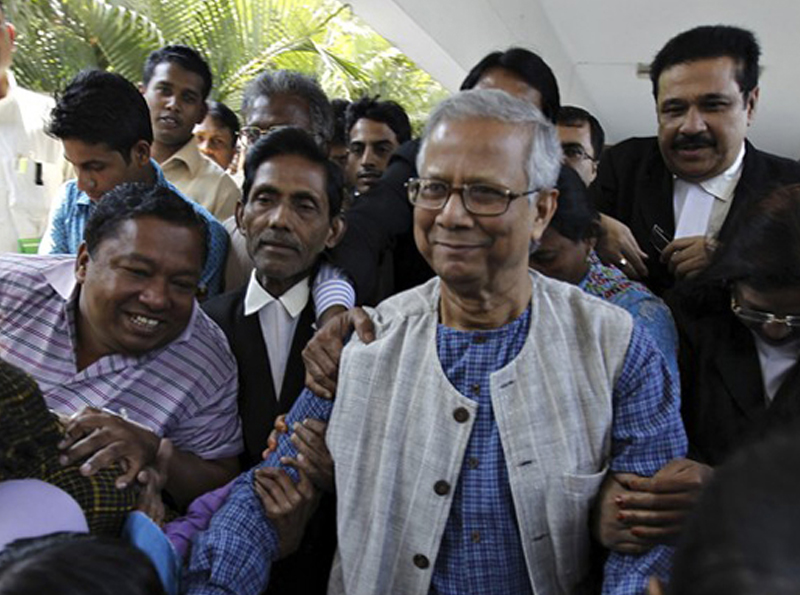Bangladesh And Its Continued Defamation Of Grameen Bank

“Jealousy is both reasonable and belongs to reasonable men, while envy is base and belongs to the base, for the one makes himself get good things by jealousy, while the other does not allow his neighbor to have them through envy.”
~Aristotle
He is perhaps the most celebrated citizen of Bangladesh, winning the Nobel Peace Prize in 2006. In 1983, he founded Grameen Bank, an organization which launched the innovative practice of providing small loans to rural women in poverty. In 2008, he was rated number two in Foreign Policy Magazine’s list of The Top 100 Global Thinkers. His name is Dr. Muhammad Yunus and his organization, Grameen Bank, became a globally recognized model for microfinance. The organization did not stop there, launching 48 other firms from widely varied sectors such as mobile phones and textiles. There is not a single country which does not honor and respect Dr. Yunus, except one: his home country of Bangladesh.
In 2011, the Bangladesh Prime Minister, Sheikh Hasina’s government ousted Dr. Yunus from his position as the Managing Director of Grameen Bank, announcing that the bank needed to be “reviewed and investigated”. The allegations were based on questions on the effectiveness of microfinancing, stating that essentially, it was nothing more than being a loan shark and the motives were profit-based. Furthermore, there were allegations of coercion, peer pressure and physical harassment of loan defaulters, which were reported about some other microfinance organizations. These allegations were automatically dispersed to Grameen Bank. It had become evident that the government of Bangladesh, in particular, Sheikh Hasina, was exploiting the questions of morality which began to be associated with microfinance in general in order to expel Dr. Yunus.
He is perhaps the most celebrated citizen of Bangladesh, winning the Nobel Peace Prize in 2006. In 1983, he founded Grameen Bank, an organization which launched the innovative practice of providing small loans to rural women in poverty. In 2008, he was rated number two in Foreign Policy Magazine’s list of The Top 100 Global Thinkers. His name is Dr. Muhammad Yunus and his organization, Grameen Bank, became a globally recognized model for microfinance. The organization did not stop there, launching 48 other firms from widely varied sectors such as mobile phones and textiles. There is not a single country which does not honor and respect Dr. Yunus, except one: his home country of Bangladesh.
In 2011, the Bangladesh Prime Minister, Sheikh Hasina’s government ousted Dr. Yunus from his position as the Managing Director of Grameen Bank, announcing that the bank needed to be “reviewed and investigated”. The allegations were based on questions on the effectiveness of microfinancing, stating that essentially, it was nothing more than being a loan shark and the motives were profit-based. Furthermore, there were allegations of coercion, peer pressure and physical harassment of loan defaulters, which were reported about some other microfinance organizations. These allegations were automatically dispersed to Grameen Bank. It had become evident that the government of Bangladesh, in particular, Sheikh Hasina, was exploiting the questions of morality which began to be associated with microfinance in general in order to expel Dr. Yunus.
Because Norway is a 58% stakeholder in Grameenphone, it conducted an investigation and cleared all allegations of any misappropriation of funds by the organization. However, this did not stop the Bangladesh government in launching its crusade against Dr. Yunus and Grameenphone, clearly aimed at defaming and discrediting a citizen of Bangladesh who, in any healthy environment of governance, would be lauded. Furthermore, there was the case of the World Bank refusing to finance the Padma Bridge on the basis of what it stated was corruption in the highest levels of Sheikh Hasina’s government. In a convoluted move, the Awami League government decided to use the World Bank’s refusal as one influenced by Dr. Yunus. Once again, the allegations were baseless.

